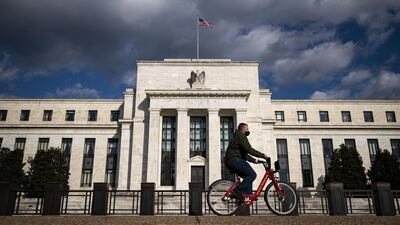Markets were relieved to see a peaceful inauguration in the United States last week and a subsequent euphoric reaction to President Joe Biden’s stimulus plans pushed global equity markets to new highs. However, by the end of it all, a note of caution was struck, with profit-taking setting in amid some warnings that challenges still lie ahead.
Business as usual was the main characteristic displayed by markets through most of the last week, as the announcement of a $1.9 trillion stimulus plan by Mr Biden propelled most major equity markets to new highs before retreating slightly at the end of it.
Elsewhere, 10-year bond yields consolidated around 1.1 per cent, gold was steady at $1,862 per ounce, close to its 50-day moving-average, and oil prices backed off recent highs, but remained broadly underpinned. The US dollar resumed losses in currency markets as a risk-on tone took hold, with sterling being one of the main beneficiaries amidst a strong vaccination rollout, while Bitcoin lost ground.
The challenge now will be to turn many of Mr Biden’s policy announcements into reality, which on the main issue of the economy, will be a lot harder than simply signing executive orders. Getting the $1.9tn spending plan through Congress is already looming as a significant hurdle, with prominent Republican Senators questioning the necessity of such a large stimulus on top of the $900 billion package that came in December.
Including President Biden’s proposed fiscal package, the total cost of US fiscal support since the start of the pandemic amounts to about $6tn, and with only a very slim majority in the Senate, Mr Biden’s Democratic Party may struggle to get all the votes needed to pass the latest pandemic support package.
Janet Yellen, Mr Biden’s Treasury Secretary nominee, last week called for politicians to “act big” to fight the financial fallout from the coronavirus pandemic, warning of the “long-term economic scarring” in absence of further action. However, with Washington fresh from a contentious handover of power and the opposition Republican party looking to score points against the freshly inaugurated president, it is difficult to envisage an easy ride.
Commentators are also concerned about the long-term challenges facing the economy, with Mohamed El-Erian of Cambridge University, observing in the Financial Times that "the financial system challenge for Mr Biden is not a short-term need to address immediate dislocations, but the longer term problem of relinking bubbly markets to economic realities".
In essence, he was talking about the disconnect between Wall Street and the real economy, but more than just being a gap in the relative performance of equity markets and economic activity, it is also seen in terms of widening income and wealth gaps reflecting political and social divides and the distribution of debt, which disproportionately affects low-income households.
Mr El-Erian went on to discuss the role of the US Federal Reserve in perpetuating these disconnects by constantly reassuring investors to believe “that there are only upsides in investing in markets disconnected from reality”.
Fed chair Jerome Powell frequently feels obliged to reiterate that the central bank will remain dovish, seemingly afraid of a repetition of the “taper tantrum” that might occur should it threaten to pull back on its easy monetary policies even just a little bit.
Once again, the Fed will face the challenge of threading the needle in the language it uses when it meets this week for its next Federal Open Market Committee meeting (January 26-27), but following Mr Powell’s comments of early January when he said that the time to raise interest rates “is no time soon”, it is unlikely that there will much, if any, deviation from this message. This underscores that the Fed will not be acting pre-emptively to rein in price pressures, instead allowing inflation to overshoot as it continues with quantitative easing and to monetise the Treasury’s debt.
The priority will again be to ensure short-term financial market stability holds and to avoid any risk of a correction or meltdown in markets, which means that some of the challenges facing the US economy will again be shunted into the longer term. Markets will no doubt respond favourably once again, but at the risk of building up even bigger imbalances down the road.
Tim Fox is a prominent GCC economist and financial markets analyst and is an adviser to St Gotthard Fund Management.


